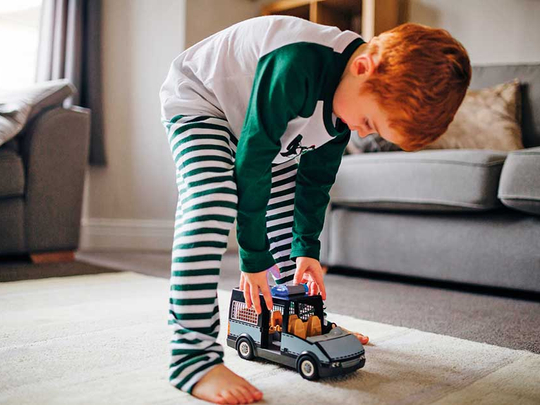
My son’s first sentence was “thank you,” confirming our suspicions that we were the parents of the century. His next phrase, however, was “I want that,” followed soon after with “I don’t want that,” usually rendered in an earsplitting scream. We quickly realised that we’d created a human being with desires and dislikes after all. Whether babies or adults, we want what we want when we want it. And in our current culture, many of us can get the things we want when we want them.
As a result, we’re swimming in stuff.
Despite smaller families, we now own bigger houses, we drive bigger cars, and our kids have more toys than ever before. With the rise in cheap labour, prices have dropped on almost everything, from toys to clothes and more. We can get almost anything we desire delivered to our doorstep with the click of a button. Despite enormous houses, people now spend billions on storage space. New technologies offer us instant access to entertainment anywhere we go.
All this “freedom of choice” actually makes us more stressed and lonely, less happy, and less motivated. As our options as consumers grow, our happiness dwindles. In fact, Western cultures lead the world in depression, anxiety and mental illness at all ages.
Today, any 30-minute TV show includes at least eight minutes of advertisements, and much of the television programming for kids is rarely more than a 22-minute commercial for tie-in toys or other merchandise. Making it even harder to resist, corporations spend $17 billion a year marketing to kids — an almost 200-fold increase over the past 30 years.
Considering all we’re up against, what can we do?
For starters, we can explain to kids what marketing is and how it’s designed to fool our brains. (Check out the Campaign for a Commercial-Free Childhood for some helpful ideas.)
Next, we can set limits on buying toys and reserve gifts only for special occasions. This gives kids something to look forward to (as opposed to expecting it), builds patience, enhances their appreciation and makes them happier.
Third, we can serve as healthy models by not overly engaging in retail therapy. If we regularly send the message to our kids that stuff buys happiness, we can’t expect them to learn otherwise.
Kids need mastery of their toys, not superficial relationships with as many possessions as possible. You probably noticed early on in your child’s life that kids want the same books and games over and over again. The repetition might drive us adults crazy, but it’s actually critical for a child’s cognitive development. Studies show that when kids have too many toys — even more than five at once — they are less able to focus enough to learn from and master them. You’ve also probably witnessed how creative and engaged kids become when they have to invent new toys and games out of virtually nothing. If necessity is the mother of invention, perhaps boredom is its father.
In the bestseller The Life-Changing Magic of Tidying Up, Marie Kondo offers some simple advice for letting go of material things. She suggests asking yourself, “Does this item spark joy?” If it does, keep it. If it doesn’t, express your gratitude for the purpose that thing once served and wish it a fond farewell. We can practice this with our children by regularly sorting through old toys and clothes.
Yet letting go is hard. Humans have been wired through evolution to believe that having more will make us safer and happier, even when we have more than enough. Remember, parents: Aim for the middle path. Start by becoming aware and discussing with your kids what you really do and don’t need in your life.
To organise and let go of stuff before the new-toy onslaught, there are a few ways you can involve them in the process:
- Consider engaging kids’ imagination and natural compassion. For example, for younger kids, ask which toys are lonely and might be happier, and might bring happiness, in a new home. Imagining the story of that toy’s next journey can help make the thank-you and goodbye that much easier.
- Set up a toy swap or a donation drive. Entrepreneurial kids can sell their old toys and spend the money on something new, or donate that money to a good cause. Sometimes the motivation for letting go can be as simple as helping others.
- When your kids make their gift list for the holidays, consider offering them experiences instead of things. Research shows that experiences do more for our happiness and our relationships than objects do. We can also encourage sharing and compassion by giving our children gifts to share, which has the added benefit of the family ending up with less stuff.
Some degree of simplification doesn’t have to mean becoming an ascetic. But keep in mind that less is more — more space, more time, more money, more creativity, more gratitude, and more harmony and happiness.
–Washington Post
Christopher Willard is a clinical psychologist and consultant specialising in bringing mindfulness into education and psychotherapy. He is the author of Growing Up Mindful, and the new book Raising Resilience: The Wisdom and Science of Happy Families and Thriving Children. Willard teaches at Harvard Medical School.









